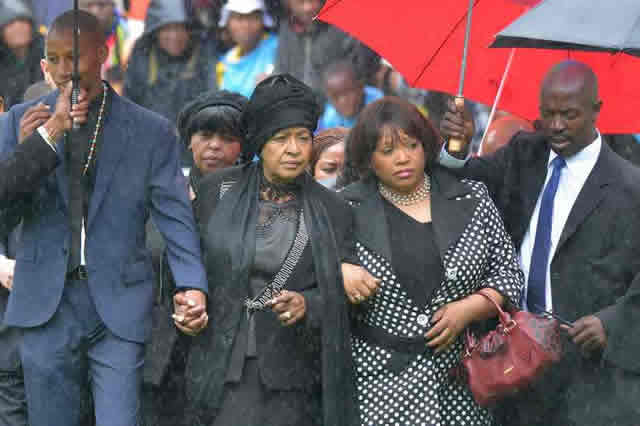When death alters African character


Winnie Madikizela-Mandela (centre) and daughter Zindzi (right) arrive for Mandela’s memorial service at the FNB Stadium in Johannesburg, South Africa, on Tuesday. — AFP
TIME makes all the difference. If this piece had been penned a few days after the passing on of South Africa’s first democratically-elected president Nelson Mandela, one of the pillars in dismantling the evil apartheid system, I’d have done what most people did, reflect on Nelson Rolihlahla “Madiba” Mandela’s life through personal experiences.
I’d have written about my bit in anti-apartheid activism through theatre for I believe that the 1986 play” Katshaa! The sound of the AK47 rifle” had its place in history.
I might have written about events at the University of Zimbabwe, on the morning of June 7, 1986 when an empty chair with academic regalia draped over it stood out and brought tears down the cheeks of everyone in the Great Hall, when the Vice Chancellor Professor Walter Kamba read the citation, which said in part, “His more than 23 years in South African jails, coupled with his stubborn and unambiguous refusal to accept conditional release designed to compromise him and his party, have made Mandela a living legend. In the minds of many he is a great man, a hero and the intractable incarnation of the protracted struggle for freedom and liberty in South Africa and everywhere, a towering personality.”
I could not think of a haunting moment as this.
The empty chair and the academic regalia told the story of Mandela who could not travel to Zimbabwe to receive his honorary degree, a Doctor of Laws degree, since he was incarcerated at the infamous Robben Island prison.
Instead, his daughters Makaziwe and Zenani came to Zimbabwe. Unlike Tanzania’s founding President Mwalimu Julius Nyerere, Zenani received the honorary degree on her father’s behalf, but she could not sit on that chair and neither could she put on the academic regalia, because she was not Nelson Mandela.

Flashback . . . A picture taken on February 11, 1990 shows anti-apartheid leader Nelson Mandela (centre left) and his wife Winnie raising victorious fists upon Mandela’s release from prison. — AFP
I might also have gone down memory lane and said how February 11, 1990 changed South Africa, Southern Africa and the African continent.
For on that day, Mandela emerged from prison, not dressed in the demeaning prison garb as prisoner 46664, but clad in a suit, holding his wife Winnie Mandela’s hand, with raised clenched fists. It was a moment the world realised that the fight was not for naught after all, for Mandela was still alive and was also “free”, because after so many years of counting, it was easy to slide back into feelings of dejection and think that they were lying to us that he was still alive.
I could also have reflected on the moments when you realise that media houses around the globe had their Mandela plans tucked away somewhere, waiting for that big moment. Bizarre and inhuman as it might sound, this is reality in this industry especially for personalities like Mandela. So much was in the public domain in so short a time: pictures and text, because a Mandela plan had always been there.
But today, like Mark Antony in Julius Caesar, I just hope to bury Mandela. I leave the praising to others, genuine or not.
I make my brief remarks, exactly a week after the death of Madiba. Everyone has had to say something about Mandela from the least to the greatest.
But I write to say that Mandela’s departure marks the beginning in Africa’s walk, for his life is about Africa’s yesterday, today and tomorrow. It is part of the Organisation of Africa/African Union’s Golden Jubilee celebrated the very year Mandela left us in as much as it is an entry point into how Agenda 2063 will be realised, 50 years on.
Agenda 2063 will demonstrate to the international community that Africa has come of age. If Africa could produce a son who is mourned and celebrated by citizens on all five continents, then there is something about Africa that it is failing to exploit on its own. It is up to Africa to open its eyes and realise what it is made of and how it can claim its rightful place.
But I also ask: from Samora Machel’s tragic death to that of Mandela, has Africa’s mourning rituals and character been altered? Why and by whom?
We continue to witness how the media is dealing with Mandela’s death and you tell yourself that if globalisation can turn us into such information vultures, then let it pass.
Robert Mshengu remarked, “Many Africans and politically progressive people view the current hype over his actual death with mixed feelings. While we remember at his passing his heroic contribution to the struggle for justice in South Africa and elsewhere in the world, we are disgusted by a lot of the media and famous personalities who now profess to be his admirers. We are disgusted by South Africa’s typical tendency to see itself as one of the States of America rather than an African country.
“As Russian television pointed out, the hype does not mention the truly progressive and brave things Mandela spoke out for – the cause of the Palestinian people, Cuba, the sanctions against Libya and Bush’s invasion of Iraq – when he had made a speech in which he said: ‘If there is a country that has committed unspeakable atrocities in the world, it is the United States of America. They don’t care for human beings.’”
I am in the media and have also wondered at these excesses and the genuineness for I have seen black people used as cash cows only to be dumped when there is a new candidate. Michael Jackson comes to mind.
The media can define agendas, but why is it that Mandela; a son of Africa has been packaged for the Western audience? In order to understand and appreciate Mandela’s legacy and how to move it on, background information was critical. However, Mandela’s visits to a number of African countries, Zimbabwe included seemed insignificant and inconsequential to the media, including South African media houses. But, the news channels never ran short of material on Mandela’s visits to the Americas and Europe.
When some remarks seem off colour, it is because people looked for Mandela in Africa, among his own peers.
People wondered whether it was a deliberate ploy and also an attempt to alienate Mandela from Africa. Some Herald online readers were miffed when it published pictures of Mandela’s visit to Zimbabwe together with President Mugabe’s message of condolence.
Apart from the copyright element, they probably did not realise that Mandela indeed visited Zimbabwe and that Baker Avenue was renamed Nelson Mandela Avenue. Some of the most important symbols in Zimbabwe are scattered along Nelson Mandela and Samora Machel Avenues: the Parliament of Zimbabwe, Africa Unity Square, Munhumutapa Building, High Court and the Reserve Bank of Zimbabwe. This scenario is replicated in many African countries, but it was not a story worth telling.
But why blame them? Their agendas are different from ours. What it means is that Africa is failing to tell its own story. This is the challenge that Mandela’s death is bequeathing on Africa. Its either Africa tells its own narrative — undiluted — or it will have others doing it for them.
In the process Africa’s character will be altered to suit the storyteller’s intentions. As Mandela is finally interred in Qunu this Sunday, Africa has to reflect on this. We cannot talk about Mandela’s legacy or lack thereof without a perspective of Africa’s founding principles and values. How solid are they in order for them to see them through Agenda 2063 and Agenda 2113 thereafter?
The book of Prophet Isaiah 6:1-8 is very instructive in this regard: “In the year that King Uzziah died, I saw the Lord, high and exalted, seated on a throne; and the train of his robe filled the temple…”
When our heroes depart, what do we see?






Comments